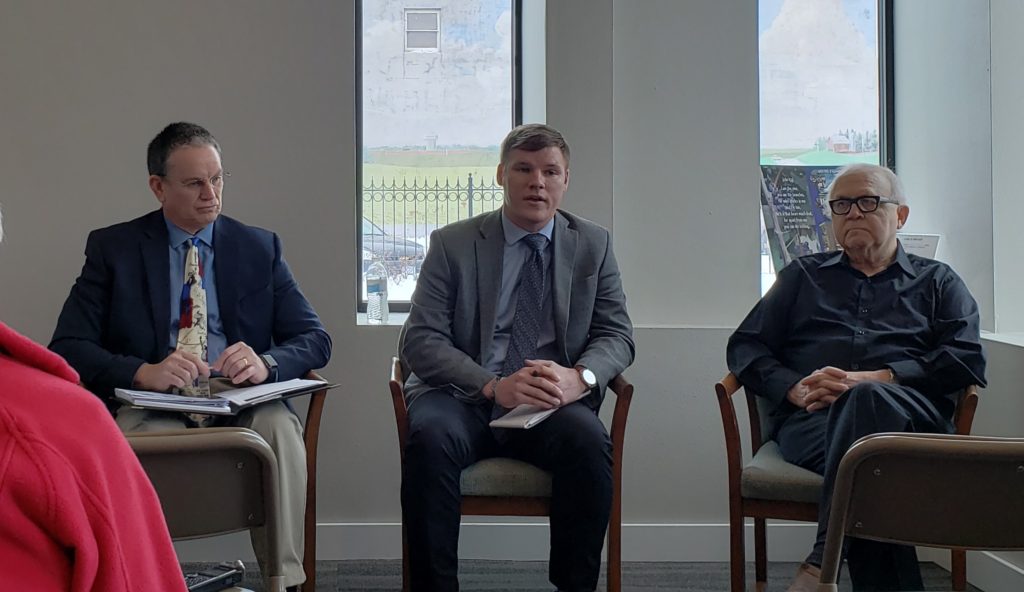The discussion was lively when Sen Jerry Behn and Rep Phil Thompson met with constituents Saturday at a “Meet Your Legislators” event hosted by the Thomas Jefferson Gardens board.
About 30 persons attended, with a near even split of known political affiliations. Behn and Thompson are both Republicans.

Freshman representative Thompson opened the forum saying that the process of approving funding for K-12 education was “eye-opening.” He called it “a very complex process, and kind of a battle to bring a lot of resources back to our community.” He said he was satisfied in the transportation equity package that will bring about $248,000 additional to Greene County Schools.
“That was the first time I felt like we accomplished something, and so far it’s been the best part of my short career as a state representative as far as bringing something home,” Thompson said.
He said it had been a hectic week in the legislature with another hectic week to come as the first funnel date is March 8.
Behn agreed that the Statehouse is in a very busy stretch. He said the Education Bill, with $128 million in new money was “well-conceived… It came out nice.”
He said the Senate’s budget target is $7.619 billion, almost the same as last year. He called the budget “a good starting frame of reference,” and said the House, the Senate and the governor are all close on their budget plans.
State funding for non-public education was a topic of discussion raised by Chuck Offenburger early in the forum. Behn is proposing instituting educational savings accounts, which circumvent the constitutional question of state funding for private schools by providing funds to parents for their children’s education. The parents then pay the school.
Behn claims educational savings accounts allow for more parental involvement and save the state money, as only 87 percent of the per pupil allocation provided to public schools is provided to non-public school students.
He said it would introduce competition in education, motivating public schools to do a better job educating children. “I’m not suggesting anything about doing away with public education. I think public education is fine. But I think parents ought to have the ability to choose. I think educational savings accounts do that,” Behn said.
According to Behn, educational savings accounts have improved education in not only private schools, but in public schools as well. “Every public school system wants to maintain as many children as they possibly can,” he said. “If they have a captive audience, they’re not motivated to take care of those children at the same level… All we’re trying to do is get the best outcomes for children.”
Greene County school superintendent Tim Christensen asked Behn where state funds would come from for educational savings plans. Behn said his original bill has been amended so the savings accounts would be available only to parents enrolling their children in a public school not in their home district, very similar to open enrolling. He also said the plan would need to be phased in for non-public school students, and that method hasn’t been suggested yet.
Finally, Behn said the educational savings account bill doesn’t have enough support to get to the Senate floor.
There was also discussion of the school omnibus bill. Earlier in the week the Senate had considered eliminating a mandate that districts have school nurses and teacher librarians. Behn said the intention was only to strike the mandate, giving local districts the power to determine staffing. The assumption was that because most districts would continue to have those positions. He said the public reaction was negative enough that consensus in the subcommittee was that it wasn’t an argument they wanted to pursue.
Dale Hanaman, who had spoken to the county supervisors earlier in the week about a resolution asking the legislature and the Department of Natural Resources to review the master matrix on which concentrated animal feeding operations (CAFOs) are scored, asked Behn and Thompson about the matrix.
Both asked for specific things to look at in the matrix. Thompson said there are conversations about reviewing the matrix often. “There always is informal conversation about it. It’s on our radar,” Thompson said.
Another topic of discussion was the purchase of public lands for recreation. Behn said the Senate and the House are both looking at funding for public land purchase.
He said the Senate file is trying to tighten up the use of a state revolving loan fund that uses state funds with a federal match to provide money for projects related to water quality and safe drinking water.
The fund was started in 1989, Behn said. It has more recently been used by the Iowa Natural Heritage Foundation to purchase land. However, the foundation is a private group. Farmers have taken exception to a private organization being able to access public funds to compete with them in the purchase of farmland.
Senate Study Bill 1221 would not keep the state from purchasing land for recreation, but would redefine which projects would be eligible for funding.
Adrienne Smith asked about the status of changing how the judicial nominating committee is formed. Thompson said the bill that was first proposed has been amended so district court judge appointments would not be involved. He said he doesn’t think there are enough votes in the House to move the bill forward.
